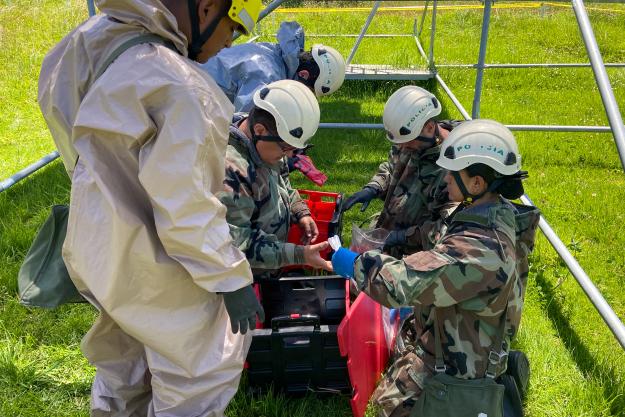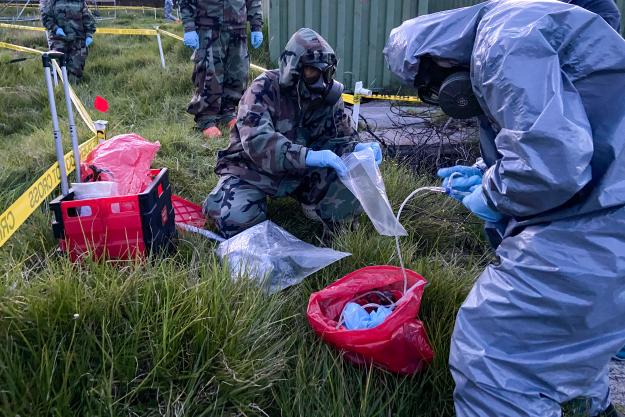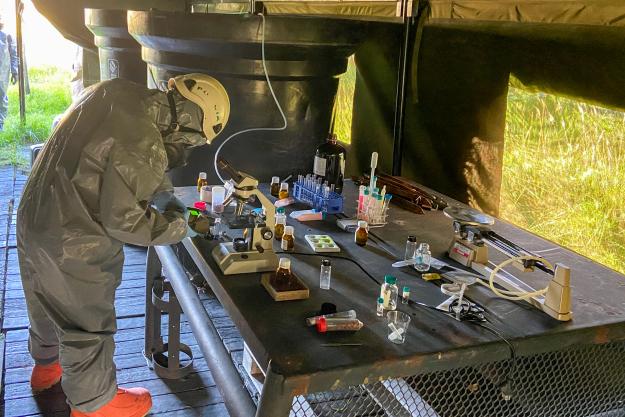
THE HAGUE, Netherlands–1 September 2022–The Technical Secretariat of the Organisation for the Prohibition of Chemical Weapons (OPCW), in collaboration with the Government of the Republic of Colombia, organised a training course for first responders from Latin America and the Caribbean to enhances regional capacities in sampling and analysis in contaminated environments. The training was held in Spanish in Bogota, Colombia, from 15 to 19 August 2022.
The specialised course provided theoretical and practical training on sampling of chemical substances in different complex scenarios. Participants gained crucial skills for obtaining and preserving evidence during events involving chemical warfare agents and toxic industrial chemicals. Field exercises and lessons were organised by the National Police of Colombia’s Unit of Special Operations in Emergencies and Disasters (POLNALSAR).

In her opening remarks, Coordinator of Disarmament and Non-Proliferation of the Ministry of Foreign Affairs of Colombia, María Milagros Ávila Paz, underscored Colombia’s continuing support for the OPCW’s regional capacity-building programmes and the importance of coordinating approaches to chemical emergencies by first response agencies such as the military, police, and firefighting services.
The training course was jointly organised by the OPCW and the Permanent Representation of the Republic of Colombia to the OPCW. It was technically supported by the Ministry of National Defense of Colombia and its Brigade of Engineers for attention and prevention of disasters of the National Army (BRIAD), as well as the Directorate of Criminal Investigation and Interpol (DIJIN) of the National Police of Colombia, and the National Directorate of Firefighters of Colombia (DNBC).
The course was attended by 29 participants from 11 OPCW Member States: Argentina, Brazil, Chile, Colombia, Ecuador, El Salvador, Guatemala, Mexico, Nicaragua, Panama, and Peru.

Background
Under Article X of the CWC, Member States “have the right to participate in, the fullest possible exchange of equipment, material and scientific and technological information concerning means of protection against chemical weapons.”
As the implementing body for the Chemical Weapons Convention, the OPCW, with its 193 Member States, oversees the global endeavour to permanently eliminate chemical weapons. Since the Convention’s entry into force in 1997, it is the most successful disarmament treaty eliminating an entire class of weapons of mass destruction.
Over 99% of all declared chemical weapon stockpiles have been destroyed under OPCW verification. For its extensive efforts in eliminating chemical weapons, the OPCW received the 2013 Nobel Peace Prize.
More Information
- Directorate of Criminal Investigation and INTERPOL of the National Police – DIJIN
- Engineers Brigade of the National Army of Colombia
- Unit of Special Operations in Emergencies and Disasters of the National Police – PONALSAR
- National Directorate of Firefighters of Colombia (DNBC)
- Article X of the CWC – Assistance and Protection Against Chemical Weapons
- Ensuring Preparedness
- Photos from the event
- OPCW Basics: How does the OPCW help prepare for and respond to a chemical attack?
